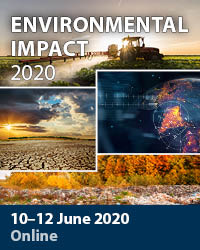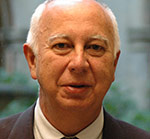Environmental Impact 2020
5th International Conference on Environmental and Economic Impact on Sustainable Development
![]()
10–12 June 2020
Online
Overview

With the main objective to preserve our delegates’ well-being, but also with the belief that the scientific community should not be stopped, WIT decided that Environmental Impact 2020 should not take place as scheduled, in Seville, Spain, but take place as an online event instead.
The conference was organised by the Wessex Institute, UK, represented by Professor Juan Casares.
The conference, which started in New Forest in 2012 is well-established and always attracts a wide international spread of delegates. The variety of topics covered by the conference reflects the impact of economic constraints on the environment, taking into account the social aspects as well as the over-use of natural resources.
Opening of the Conference
The conference programme opened with a presentation of the Wessex Institute followed by an opening address of the Environmental Impact Conference Series welcoming delegates to this year’s event.
Invited Presentations
There were a series of invited lectures on advanced topics of research and applications, as follows:
- “The Brazilian environmental impact assessment system: A critical analysis” by Dr. Paulo Roberto Armanini Tagliani, Federal University of Rio Grande, Brazil.
- “Municipal solid waste management in Amazon: environmental, social and economic problems, gaps and challenges” by Prof. Gerson Araujo de Medeiros, Sao Paulo State University, Brazil.
- “Protecting the environment by reducing food loss and waste across the food supply chain” by Dr Shahla Wunderlich, Nutrition Optima Llc, United States.
- “Lyapunov functions as the divergence functions for environmental assessment: theoretical background” by Prof. Yuri Pykh, Russian Academy of Sciences, Russia.
- “Food production systems, policies and rural planning, contributions to sustainability and environmental impact” by Prof. Wayne Cladwell, University of Guelph, Canada.
- “Canadian horticultural growers’ perceptions of beneficial management practices for improved on-farm water management” by Dr. Suren Kulshreshtha, University of Saskatchewan, Canada.
- “Recovery assessment: The process needed after impacts have exceeded sustainability limits” by Prof. Bryan Jenkins, University of Adelaide, Australia
- “Use of structured decision support for valuing lost cultural benefits associated with environmental injuries” by Mr David Hanson, HansonRM, United States.
Conference Sessions
The papers presented at the conference covered the following topics:
- Environmental policies and planning
- Food waste reduction and impact on the environment
- Legislation and regulations
- Health effects
- Climate change
- Food production systems and policies
- Public communication and involvement
- Social-ecological issues
- Human factors
- Environmental sustainability
Conference Publication
Papers presented at this conference are published in Vol. 245 of the WIT Transactions on Ecology and the Environment (ISSN 1743-3541). Papers presented at the meeting are available Open Access in the eLibrary of the Wessex Institute (https://www.witpress.com/elibrary) from where they can be freely downloaded by any interested parties.
A few papers were selected for publication in the International Journal of Environmental Impacts. This Journal covers the subjects on the numerous environmental problems present in modern society and their impacts, taking into account scientific, economic and social issues.
Closing of the Conference
We are very sorry that we were not able to meet our delegates in person this year.
WIT is aware that one of the benefits of the conferences is the networking among colleagues and the only reason for implementing this strategy is the exceptional circumstances created by the COVID-19 crisis. Thus, to allow the authors to maintain that capability, delegates registered at Environmental Impact 2020 who had their paper accepted for publication, will be able to attend the next conference in the series (or a different conference of their choice devoted to similar topics that takes place prior to that) free of charge, and if they wish, make an oral presentation of their published paper.
We would like to thank the delegates for participating in the event and look forward to meeting them at the next conference in the series.
Related Conferences
Sustainable City 2021, 5–7 October 2021
Energy and Sustainability 2021, 6–8 October 2021


 Wessex Institute
Wessex Institute